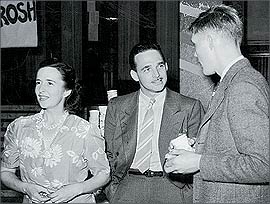


 |
 |
Issue Contents : : Around Tappan Square : : Page [ 1 2 3 4 5 6 7 8 9 ]
Remembering a Campus LegendA Tribute to Bill Seaman
 |
|
| Bill Seaman, center, at Oberlin in the late 1930s | |
College life proved to be an extraordinary change. After my introduction to campus and my first classes, I began to realize that Bill would be a part of my life forever. He was fun to be with--a real charmer--and would no doubt help guide me during my college years. He had chosen as my roommate another athlete, Bob Schloerb, a Chicago high school graduate. We didn't know then that Bill had been successfully pairing up roommates for 14 years. He did a fine job with us, too; Bob and I have continued our friendship for 51 years.
To this day, I can see Bill moving about quietly and always with a capacity for fun and an understanding of people. In his search for new recruits, he sought just the right students for the Oberlin environment. On campus, he helped them adjust to their new demands and in their dealings with faculty. For many of us, Bill Seaman was the glue that held together the people and ideals of Oberlin College.
Not long into the term, maybe two weeks, I realized the need to start planning my academic future. I made an appointment with the academic dean, walked into his very stern office, and explained my purpose. All I remember, really, was being told to re-read the academic program--no warmth, no understanding of my question. Quickly, I made a date to see Bill Seaman. In his simple, caring way, he helped me to think about the mission of Oberlin and the variety of options open to me. So simple, so caring, so in tune with me and my search.
A few weeks later, I had yet another occasion in which to seek out Bill's good advice. I had spent 12 years of my childhood in Greece--the last two under a dictatorship. Germany and Hitler had deeply affected my understanding of life and my own destiny in this world. Now I was at Oberlin, reading newspapers that were filled with accounts of the Marines and Guadalcanal. Who was I to be sitting in college, dodging the whole enterprise? Once again, I sought out Bill Seaman and his perceptive ways.
I explained to him my internal conflict between love of country and my new thoughts of enlisting in the Marines. He let me talk and then suggested, "If you really believe in what is going on and want to respond to the demands you feel, why don't you join the Marine Corps Reserves? Do the best you can here as a student and prepare for what they may call you up to do."
I joined the Reserves about a month later and continued--with-out guilt--my educational goals at Oberlin. How many others of us had walked into Bill's office with such deep uncertainties, interrupting his own problems and taking unto ourselves the wisdom and insights of such a caring man, then responding to him with no more than "Thanks, Bill--you're a real help!"
For Bill Seaman, Oberlin was a way of life. He was socially concerned and had a special capacity to bring the community together--trustees, faculty, and students. He forever believed in his responsibility to help students learn while in the company of faculty and the community. Make no mistake, he sometimes failed to achieve all of his goals, but he never stopped trying. It was this quality that made him so inspirational--he never lost faith.
The Marines did call me into service and assigned me to Oberlin College for three more semesters. The College Trustees had determined that any student who had met his basic academic requirements and had been called away to serve the country ought to be given advance credit for the learning they were about to receive in the military. So I left Oberlin with a bachelor's degree just two years and four months after I started.
During my last year of active duty in the Marine Corps, I began to explore graduate study to prepare for service in the YMCA. I had three alternatives: graduate programs at Springfield or George Williams colleges, or a small program at Yale University Divinity School. It was again time to write to Bill Seaman for advice. Without hesitation, he replied, "Why not Yale with all the opportunities it could provide?" So to Yale I went, for what I thought would be one year. Ten years later, I ended up with three graduate degrees.
I was in my second year at Yale Divinity School when Bill took his own life. What a belt. What of Fran, his wife, who had been his constant support? What of his children, Shirley and Bunky? What of friends, colleagues, faculty, and members of First Congregational Church Choir with whom he had sung so many years?
So Bill, it is now time for me to thank you properly--for coming to my home, recruiting me to Oberlin, and for a slew of advice that has lasted a lifetime. Oberlin has been forever strengthened by your profound legacy.